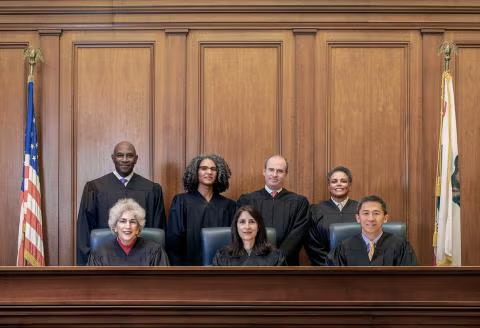Get Ready — New Employment Laws Coming in 2025
Governor Newsom formally concluded the 2024 legislative session by signing into law several new bills that greatly expand employee rights in California starting on January 1, 2025. Between now and then, California employers should review their existing policies to ensure compliance with these laws in the new year.
New State Minimum Wage (Prop 32)
On January 1, the California statewide minimum wage will increase to $16.50 per hour. This increase applies to all employers, regardless of size, unless (a) an industry-specific minimum wage law sets a higher minimum wage, (b) a local minimum wage ordinance sets a higher minimum wage, and/or (c) voters approve the statewide ballot proposition known as Prop 32 in the upcoming November election.
In California, an industry-specific minimum wage law applies to fast-food workers at chain restaurants with 60 or more locations nationally. These workers are entitled to $20.00 per hour as of April 1, 2024 with the newly formed state Fast Food Council empowered to set even higher minimum wages in the future. Another industry-specific minimum wage law applies to healthcare workers. These workers are currently entitled to between $18.00 and $23.00 per hour, depending on their employer’s size and types of services provided.
In the San Francisco Bay Area, the following localities mandate a minimum wage that is higher than the state minimum wage, meaning that in each of these localities the minimum wage in 2025 will be greater than the state’s new $16.50 per hour wage: Alameda, Belmont, Berkeley, Burlingame, Cupertino, Daly City, East Palo Alto, El Cerrito, Emeryville, Foster City, Fremont, Half Moon Bay, Hayward (for employers with 26 or more employees), Menlo Park, Mountain View, Novato, Oakland, Palo Alto, Petaluma, Redwood City, Richmond, San Carlos, San Francisco, South San Francisco, San Jose, San Mateo, Santa Clara, Santa Rosa, Sonoma, and Sunnyvale.
Finally, on election day, California voters will decide the fate of Prop 32. If Prop 32 passes, the statewide minimum wage for large employers (26 or more employees) would increase to $17.00 per hour for the rest of 2024 and increase again on January 1 to $18.00 per hour. For small businesses (25 or fewer employees), the $17.00 per hour statewide minimum wage would start on January 1 and increase again the following January 1 (2026) to $18.00 per hour.
New Minimum Salary for Exempt Employees
As a result of the increase in the statewide minimum wage on January 1, the minimum annual salary required to classify an employee as “exempt” will also increase to $68,640.00 on January 1. California employers should review all exempt employees’ salaries and make sure that each employee’s pay satisfies this new threshold. If not, the employer will have to either (a) increase the employee’s pay to this new threshold or higher, or (b) reclassify the employee as a “non-exempt” employee.
Expanded Paid Sick Leave Rights (AB 2499)
Under existing law, California employees can use their accrued PSL for, among other reasons, “safe time” absences due to domestic violence, sexual assault, and/or stalking. Starting on January 1, as a result of AB 2499, an employee will be able to use their accrued PSL (1) for the diagnosis, care, or treatment of an existing health condition of, or preventive care for, the employee or the employee’s “family member”, and/or (2) if the employee or a “family member” is a victim of “qualifying acts of violence,” defined as (a) domestic violence, (b) sexual assault, (c) stalking, and/or (d) when an individual (i) causes bodily injury or death to another individual; (ii) exhibits, draws, brandishes, or uses a firearm, or other dangerous weapon; or (iii) uses, or makes a reasonably perceived or actual threat to use, force against another individual to cause physical injury or death. A “family member” includes the employee’s child, parent, grandparent, grandchild, sibling, spouse/domestic partner, or other designated person.
AB 2499 also prohibits employers of all sizes from discriminating or retaliating against an employee (a) for taking time off from work for jury duty or to comply with a subpoena or other court order as a witness in a judicial proceeding, or (b) if the employee is a victim of a “qualifying act of violence,” and is taking time off to obtain a restraining order, medical treatment, or other relief as enumerated in the law. Under AB 2499, these protections also apply to an employee who has a “family member” who is a victim so long as the employer has 25 or more employees.
In addition, under AB 2499, an employee who is a victim of, or who has a family member who is a victim of, a “qualifying act of violence” is entitled to reasonable accommodation from the employer to ensure the employee’s safety at work. The employer must engage in the interactive process with the employee to determine whether an effective and reasonable accommodation might exist. A reasonable accommodation could include, for example, a transfer, reassignment to a different location, a modified work schedule, a changed work telephone number, or the implementation of other safety measures.
In addition, AB 2499 requires employers of all sizes to provide written notice to employees of their rights established under this new law (a) annually, (b) at any time upon request, and (c) at any time the employer becomes aware that an employee or an employee’s family member is a victim of a “qualifying act of violence.”
Finally, AB 2499 moves these leave provisions from the California Labor Code to the California Government Code, which now gives the California Civil Rights Department the power to investigate and punish employers who fail to comply with this new law.
Expanded Paid Sick Leave (PSL) Usage (SB 1105)
Existing law entitles California employees to PSL, which can be used for specified purposes including the diagnosis, care, or treatment of an existing health condition of, or preventive care for, the employee or a family member of the employee. Starting on January 1, SB 1105 adds an additional purpose for which PSL can be used – agricultural employees who work outside may now use accrued PSL to avoid smoke, heat, or flooding conditions that are caused by a local or state emergency.
Expanded Paid Family Leave (PFL) Rights (AB 2123)
Starting on January 1, AB 2123 makes it illegal for a California employer to require an employee to use accrued PTO or vacation time before taking paid family leave. Previously, an employer could require an employee to use up to 2 weeks of accrued PTO or vacation leave before that employee could access PFL benefits.
Protections for “Freelance” Workers (SB 988)
Starting on January 1, SB 988 imposes new minimum requirements in contracts between a hiring entity and a freelance worker. Under SB 988, also known as the “Freelance Workers Protection Act”, an agreement between a hiring party and a freelance worker must be in writing and include the following:
— The names and addresses of both parties
— An itemized list of services, their value, and the compensation method
— Payment due dates (or a description for determining those dates)
— Deliverable dates
Once a freelance worker has commenced providing services, SB 988 prohibits the hiring entity from requiring the worker to accept less compensation or provide more services than previously agreed to in order to receive timely payment.
SB 988 also prohibits a hiring party from retaliating against a freelance worker for doing any of the following:
— Opposing any practice prohibited by the new law
— Participating in proceedings related to the enforcement of the new law
— Seeking to enforce rights under the new law
SB 988 defines a “freelance” worker as a person, or an organization composed of no more than one person, that is hired or retained as a bona fide independent contractor to provide “professional services” in exchange for an amount equal to or greater than $250. California Labor Code §2778(b)(2) defines “professional services” to include marketing, human resources, travel agent, graphic design, fine art, tax, payment processing, photography, content contributor, licensed esthetician/electrologist/manicurist/barber/cosmetologist, appraisal, professional forestry, and performance artist services.
Ban on “Captive Audience” Meetings (SB 399)
Starting on January 1, it will be illegal in California for any employer to discharge, discriminate against, retaliate against, or take any other adverse employment action against an employee who declines to attend an employer-sponsored meeting, or otherwise declines to participate in or listen to any communications from the employer, involving “political matters” or “religious matters.” This new law, known as the “California Worker Freedom from Employer Intimidation Act,” is intended to protect employees from being forced to attend so-called captive audience meetings.
Local Enforcement of Employment Discrimination (SB 1340)
Starting on January 1, SB 1340 will allow local jurisdictions to enforce their own anti-discrimination laws when those laws are at least as protective as the state’s anti-discrimination laws. In addition, SB 1340 will allow local jurisdictions to also enforce the state’s anti-discrimination laws, but only after the state’s discrimination enforcement agency – the Civil Rights Department, or CRD – has issued a right-to-sue notice. During any local enforcement, the statute of limitations is tolled for claims arising under the state’s anti-discrimination laws; however, an aggrieved employee is still free to file a lawsuit during that time.
Driver’s License Discrimination (SB 1100)
Starting on January 1, SB 1000 will make it an unlawful practice in California for an employer to include statements about the need for a driver’s license in job postings, job applications, and other employment material unless (a) the employer reasonably expects driving to be one of the job functions, and (b) no alternative forms of transportation (e.g., taxis, Uber/Lyft, carpooling, bicycling, walking) are comparable in travel time or cost to the employer.
“Intersectionality” Addition to EEO Policies (SB 1137)
California has long prohibited discrimination and harassment based on protected characteristics — such as age, gender, race, sexual orientation, religion, HIV status or other medical conditions. Starting on January 1, as a result of SB 1137, California will become the first state in the nation to also explicitly prohibit discrimination and harassment based on the combination (or, intersection) of two or more protected characteristics.
In passing SB 1137, the California legislature explained, “intersectionality is an analytical framework that sets forth that different forms of inequality operate together, exacerbate each other, and can result in amplified forms of prejudice and harm. The framework and term ‘intersectionality’… captures the unique, interlocking forms of discrimination and harassment experienced by individuals in the workplace and throughout society.”
In passing SB 1137, the California legislature intended to codify the Ninth Circuit’s decision in Lam v. University of Hawai’i, 40 F.3d 1551 (9th Cir. 1994). In Lam, the Ninth Circuit explicitly recognized that discrimination and harassment may occur because of the employee’s combination of protected traits, not simply a single trait.
Expansion of Race Discrimination (AB 1815)
Existing California law prohibits discrimination and harassment on the basis of “race,” among other protected categories. In 2019, with the passage of the CROWN Act, “natural hair” was added as an additional protected category. Starting on January 1, AB 1815 will broaden the definition of race to include race as well as “traits associated with race, including but not limited to hair texture and protective hairstyles.” Under the new law, “protective hairstyles” include braids, locs, and twists.
New Workers’ Compensation Notice (AB 1870)
Starting on January 1, AB 1870 will require California employers to include in workers’ compensation notices a statement explaining that an injured employee has the right to consult an attorney for advice and that any attorneys’ fees will be paid from the injured worker’s award.
New Whistleblower Posting (AB 2299)
Existing law requires employers to prominently display in the workplace a list of employees’ rights and responsibilities under the state’s various whistleblower laws. Starting on January 1, AB 2299 will require the California Labor Commissioner to develop a model list of those rights and responsibilities. AB 2299 further specifies that an employer who prominently displays the California Labor Commissioner’s model list has complied with its disclosure obligations under California law.
Insights
OUR BLOG


